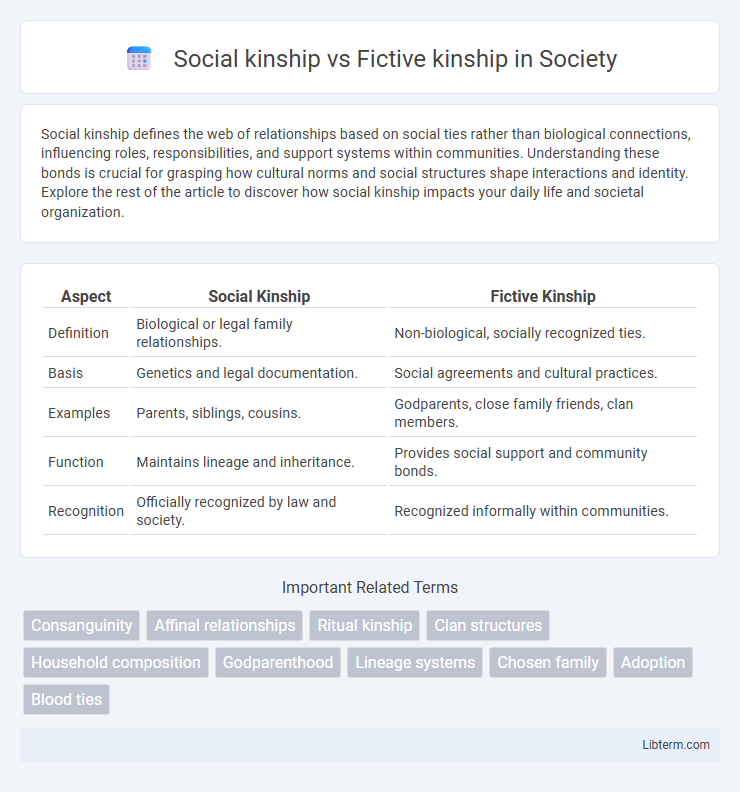Social kinship defines the web of relationships based on social ties rather than biological connections, influencing roles, responsibilities, and support systems within communities. Understanding these bonds is crucial for grasping how cultural norms and social structures shape interactions and identity. Explore the rest of the article to discover how social kinship impacts your daily life and societal organization.
Table of Comparison
| Aspect | Social Kinship | Fictive Kinship |
|---|---|---|
| Definition | Biological or legal family relationships. | Non-biological, socially recognized ties. |
| Basis | Genetics and legal documentation. | Social agreements and cultural practices. |
| Examples | Parents, siblings, cousins. | Godparents, close family friends, clan members. |
| Function | Maintains lineage and inheritance. | Provides social support and community bonds. |
| Recognition | Officially recognized by law and society. | Recognized informally within communities. |
Defining Social Kinship
Social kinship defines relationships based on social roles and interactions rather than solely on biological or legal ties, emphasizing the importance of culturally recognized bonds within communities. This concept includes family-like connections established through shared experiences, support systems, and mutual obligations that transcend genetic lineage. Understanding social kinship highlights how societies construct and maintain social networks that foster cooperation and identity beyond traditional kinship frameworks.
What is Fictive Kinship?
Fictive kinship refers to social relationships that are considered family bonds despite lacking biological or legal ties, often seen in close friendships or community groups where individuals treat each other as relatives. This concept contrasts with social kinship, which is based on culturally recognized blood relations or formal family connections. Fictive kinship plays a crucial role in providing social support and strengthening community cohesion beyond traditional family structures.
Key Differences Between Social and Fictive Kinship
Social kinship refers to relationships based on blood ties, marriage, or legal connections recognized by society, such as parents, siblings, and cousins. Fictive kinship involves socially constructed bonds that mimic family relationships without biological or legal basis, like godparents or close family friends considered "aunts" or "uncles." The key difference lies in social kinship's foundation on formal, recognized ties, whereas fictive kinship is grounded in chosen, culturally symbolic relationships.
Historical Perspectives on Kinship Types
Historical perspectives on kinship types reveal that social kinship emphasizes relationships formed through social bonds and cultural practices rather than genetic ties, often seen in marriage alliances and clan affiliations. Fictive kinship, by contrast, involves the attribution of kin status to individuals not related by blood or marriage but integrated into social structures through rituals or communal roles, common in indigenous societies and diasporic communities. Anthropologists trace these distinctions to understand how diverse cultures construct social networks and community identity beyond biological lineage.
Functions of Social Kinship in Society
Social kinship serves critical functions in society by establishing recognized familial roles that regulate inheritance, succession, and social responsibilities. It fosters social cohesion through defined obligations and support networks, ensuring stability and cooperation within communities. Social kinship also provides a framework for identity and belonging, reinforcing cultural norms and collective values.
Roles and Importance of Fictive Kinship
Fictive kinship involves relationships that are socially recognized as family bonds despite lacking biological or legal ties, playing crucial roles in providing emotional support, resource sharing, and social integration, especially in communities with disrupted traditional kin networks. These relationships often fulfill caregiving, mentorship, and communal responsibilities, bridging gaps in social safety nets where formal institutions or biological families may be absent or insufficient. The importance of fictive kinship lies in its ability to foster resilience, trust, and cooperation, reinforcing social cohesion through chosen affiliations rather than inherited ones.
Examples of Social Kinship Across Cultures
Social kinship systems, including those found in Native American clans, African tribal lineages, and Polynesian extended families, illustrate formal recognition of blood relations and inherited social roles. In contrast, fictive kinship appears in practices like godparenthood in Latin America, close family-like bonds among African American communities, and ritualized friendships in South Asia, which create socially recognized but non-biological bonds. These examples highlight how social kinship codifies genetic ties, while fictive kinship extends family structures through cultural conventions.
Fictive Kinship in Modern Communities
Fictive kinship in modern communities refers to social bonds that mimic familial relationships without biological or legal ties, such as close friendships and chosen families among LGBTQ+ groups and immigrant networks. These connections provide emotional support, resource sharing, and social stability, functioning similarly to traditional kinship systems. Unlike social kinship, which is based on blood relations or marriage, fictive kinship is flexible and adaptive to diverse social and cultural contexts.
Impacts on Identity and Belonging
Social kinship establishes identity and belonging through recognized familial ties and shared cultural heritage, reinforcing collective social roles and responsibilities. Fictive kinship creates inclusive networks based on chosen relationships, offering emotional support and identity validation beyond biological or legal connections. Both forms significantly shape personal and group identity by influencing social integration and community cohesion.
Evolving Dynamics: The Future of Kinship
Social kinship, grounded in legal and blood relations, continues to adapt through shifts in family structures and cultural norms, emphasizing biological and formal ties. Fictive kinship expands this framework by incorporating chosen families and non-biological bonds, reflecting growing social acceptance of diverse relational forms. The future of kinship lies in integrating these evolving dynamics, recognizing fluid identities and forging inclusive definitions that transcend traditional genealogies.
Social kinship Infographic

 libterm.com
libterm.com